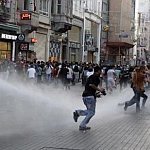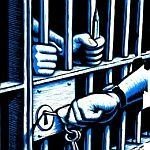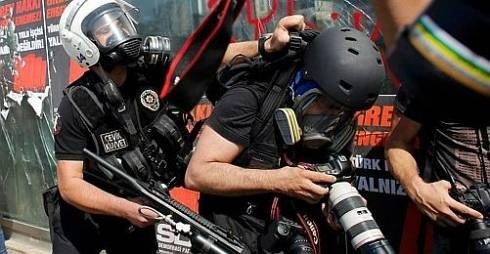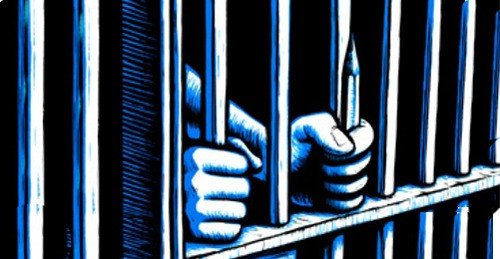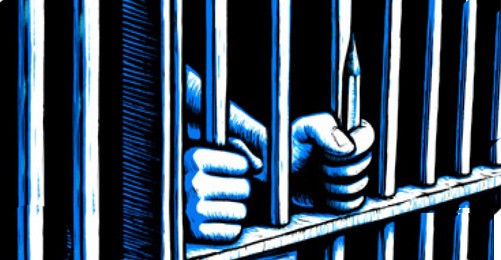
Starting on May 27, Turkey’s Gezi resistance protests affected journalist and media staff due to police violence. Police officers as well as casually-dressed individuals with high suspicion of being a policeman reportedly assaulted 105 journalists until June 30. Police violence manifested itself in the form of water/chemical water cannon, tear gas bombs, pepper gas, paint and rubber bullets. In the same period, police detained at least 28 journalists (including 5 foreign media correspondents). Police arrested 3 journalists and 2 are currently behind bars.
During the Gezi Resistance, Turkish government targeted on the media several occasions - with most mainstream media outlets having a pro-censure attitude. In the meanwhile, at least 12 journalists and 1 programmer resigned after having odds with their editorial policies. On the other hand, 3 journalist were laid for similar reasons - undermining the editorial independence and reader’s right to be informed in Turkey.
As a result, Turkey observed July 24 Press Freedom Day - 105th anniversary of censure-free newspapers - with 66 jailed journalists and 27 jailed publishers.
63 of 66 jailed journalists and 27 of 27 jailed publishers have been sent to prison for charges related with Turkey’s Anti-Terror Act and Turkish Penal Code article on “illegal organizations”. In addition to that, 37 of 66 jailed journalists and 26 of 27 jailed publishers are from Kurdish media.
Between April and June 2013, 13 individuals (including 5 journalists) have been convicted of Anti-Terror Act-related sentences with a total of 67 years, 2 months and 7 days of prison as well as 6,600 euros fine.
Around the same period in 2012, 95 journalists and 35 publishers were jailed in Turkey and Turkish courts have sentenced 24 individuals to a total of 91 years, 9 months and 18 days of prison, as well 16,000 euros fine.
Highlights from Media Monitoring Report
Topics from BIA Media Monitoring Report include "jailed journalists", "attacks, threats and impediments", "prosecutions, new-ongoing trials, verdicts", "Turkish Penal Code Articles 285-288”, "defamation, personal rights and non-pecuniary damage demands", "banned, closed, seized publications", "ECHR", "Turkish Radio and Television High Council" and “Gezi Resistance”.
On April 29, President Abdullah Gül ratified two law proposals that amended several articles on Turkish Penal Code and Anti-Terror Act - a series of revisions publicly known as 4th Judicial Package.The aforementioned revisions have been proposed under "Bill on the revision of several laws in the context of human rights and freedom of expression" and "Bill on the revision of several laws regarding judicial tribunals".
The amendments envisioned penalization of those who propagate or publish declarations of an illegal organization only in the case that content legitimizes or encourages acts of violence, threats or force.
Jailed journalists
Prosecutions and arrests on Turkey’s journalists due to Turkish Penal Code and Anti-Terror Act resumed between April and June 2013. Some of the charges on journalists and publishers / media representatives included: “Being a member of an illegal and armed organization”, “Committing a crime for an illegal organization without being a member”, “Aiding an illegal organization willingly and knowingly without being a part of its hierarchy” and “founding, managing and commanding an illegal organization”.
66 journalists and 27 publishers welcomed July 2013 behind bars in Turkey.
63 of 66 jailed journalists and 27 of 27 jailed publishers have been sent to prison for charges related with Turkey’s Anti-Terror Act and Turkish Penal Code article on “illegal organizations”. Around the same period in 2012, 95 journalists and 35 publishers were jailed in Turkey
Turkey’s 66 jailed journalists have been standing trial for the following cases: KCK, PKK and DYG (33), DHKP-C (12), Ergenekon (6), MLKP (4), OdaTV (1), IBDA-C (1), Direniş Hareket (1) and unknown organization case (1). While 2 journalists have been jailed due to sentences related to Gezi Resistance protests, another journalist is behind bars for “espionage”.
The current judicial situation of jailed journalists are as follows: convicted (18), pending trial (34) and awaiting first trial day due to incomplete indictment (14).
Attacks, threats and impediments
In the period of April - June 2013, Turkey’s journalists and media representatives faced at least 16 attacks, threats, impediments through verbal, physical, social media means. Various authorities barred 3 concert and 2 conference organizations.
Around the same period in 2012, journalists faced 14 attacks, threats, impediments through verbal, physical, social media means.
Prosecutions, new-ongoing trials, verdicts
Between April and June 2013, 13 individuals (including 5 journalists) have been convicted of Anti-Terror Act-related sentences with a total of 67 years, 2 months and 7 days of prison as well as 6,600 euros fine.
Around the same period in 2012, Turkish courts have sentenced 24 individuals (including 6 journalists) with a total of 91 years, 9 months and 18 days of prison as well as 16,000 euros fine.
Kurdish politician cases
Various prosecutors across Turkey have launched investigations on 13 Kurdish politicians (of Peace and Democracy Party or non-affiliated). Around the same period in 2012, 25 out of 29 Kurdish deputies have been subjected to 61 investigation in a period of 3 months.
“Defamation”
Between April and June 2013, 3 defendants (including 2 journalists) received a total of 1 year and 2 months of prison and 13,500 liras (roughly 5,400 euros) for charges related to "insult" and "violating personal rights".
Around the same period in 2012, 5 defendants (including 3 journalists) received a total of 90 days of prison and 44,100 liras (roughly 20,000 euros) for charges related to "insult" and "violating personal rights".
Bans, seized publications
Between April and June 2013, censure has been issued on the following publications: commercial clip (1), billboard (1), movie (1), poem (1), TV-channel logo (1), TV program (2). Reyhanlı Peace Criminal Court issued a written, visual and internet media ban regarding Reyhanlı blasts.
Around the same period in 2012, 1 book was unlisted from Education Ministry’s 100 Basic Readings List for having “obscene” content. Other bans included: song (1), comic book (1), magazine (1).
While a Communist Party banner was banned, Demokratik Vatan newspaper was closed for one month due to “illegal organization” propaganda.
ECHR
In the second quarter of 2013, ECHR found Turkey guilty of violating “long-imprisonment ban” for 2 journalists, ordering the Turkish state to pay 11,700 euros.
Around the same period in 2012, a journalists applied to ECHR, claiming that Turkey violated “torture ban” and “right to freedom and security”.
Turkey’s Radio and Television High Council (RTÜK)
Turkey's Higher Council of Radio and Television (RTÜK) ordered 177 warnings and 399 fine penalties on various TV-channels, as well as 33 warnings and 26 fine penalties on various radios in the April-June period of 2013.
21 suspensions have issued on TV-channels broadcasting from abroad according to Turkish Penal Code 29/3 regarding platform platform and infrastructure operators.
Around the same period in 2012, the council issued 96 warnings and 68 disciplinary fines on TV-channels as well as 18 warnings and 2 disciplinary fines on radios. (EG/BM)






